|
|
|
Sort Order |
|
|
|
Items / Page
|
|
|
|
|
|
|
| Srl | Item |
| 1 |
ID:
182618
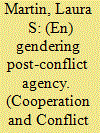

|
|
|
|
|
| Summary/Abstract |
This article explores how female agency and experience manifest in a local Sierra Leonean peacebuilding program known as Fambul Tok. While post-conflict literature, namely transitional justice and peacebuilding, has become more critical in recent years, there is still a tendency to generalize both the ‘local’ and ‘women’. There is, however, much greater scope to delineate how local programs shape and are shaped by women in these settings. While Fambul Tok was, at least theoretically, meant to better align with the needs and priorities of Sierra Leoneans, including women, the empirics suggest that female engagement ultimately results in a wide range of outcomes, which are not necessarily more ‘empowering’, ‘transformative’ or ‘good’ than international programs. Drawing on original empirical data from Fambul Tok, this article highlights the complexity of gendered power relations within these programs and how individual women have multiple, diverse and contested forms of agency and experiences within local settings.
|
|
|
|
|
|
|
|
|
|
|
|
|
|
|
|
| 2 |
ID:
167106
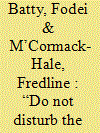

|
|
|
|
|
| Summary/Abstract |
Although the collective memory of war is frequently invoked in post-war societies, who chooses to invoke it and to what effect has been less studied relative to other aspects of such societies. In this article we employ a case study of Sierra Leone to address this deficit in the post-conflict scholarship by illustrating how the collective memory of that country’s civil war is appropriated by diverse actors in the post-war society. Drawing from field interviews, we present evidence showing how, and why, several societal groups constituted as distinct post-war identities such as victims-rights groups, former defenders of the state, or perpetrators of the violence during the Sierra Leone civil war articulate dissatisfactions with their livelihoods and the reactions of state officials to their demands. The article explains why, and how, successive governments have selectively suppressed the discontent of some groups over livelihood insecurities that are construed as threats to public order while ignoring violent protests from other groups over similar issues, in spite of a 1965 public order act restricting protests. Thus, the article argues that state officials in Sierra Leone have not demonstrated superior commitment to peacebuilding than societal groups that make demands on the state.
|
|
|
|
|
|
|
|
|
|
|
|
|
|
|
|
| 3 |
ID:
155166
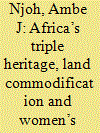

|
|
|
|
|
| Summary/Abstract |
Women have less access to land than men in Africa. Previous analyses have typically identified African indigenous culture as the problem’s exclusive source. With Cameroon, Kenya and Sierra Leone as empirical referents, an alternative explanation is advanced. Here, the problem is characterized as a product of Africa’s triple heritage, comprising three main cultures, viz., African indigenous tradition, European/Christianity and Arabia/Islam. The following is noted as a major impediment to women’s access to, and control of, land: the supplanting of previously collective land tenure systems based on family or clan membership by ‘ability-to-pay’ as the principal determinant of access to land.
|
|
|
|
|
|
|
|
|
|
|
|
|
|
|
|
| 4 |
ID:
007320
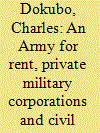

|
|
|
|
|
| Publication |
Summer 2000.
|
| Description |
51-64
|
|
|
|
|
|
|
|
|
|
|
|
|
|
|
|
| 5 |
ID:
083205
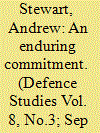

|
|
|
|
|
| Publication |
2008.
|
| Summary/Abstract |
The British military deployment to Sierra Leone in May 2000 marked therenewal of a long historical connection between the two countries. As aformer British colony, from 1829-1961 the authorities in London wereresponsible for providing the administration and governance of their WestAfrican territory as well as safe-guarding its security. This entailed thecreation of a dedicated local military structure, mixing local troops withseconded British officers to guard the frontiers of the small country againstboth external and internal threats. Although in a much revised form, thismission appears to have been now once again renewed.
|
|
|
|
|
|
|
|
|
|
|
|
|
|
|
|
| 6 |
ID:
020107
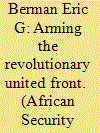

|
|
|
|
|
| Publication |
2001.
|
| Description |
5-14
|
|
|
|
|
|
|
|
|
|
|
|
|
|
|
|
| 7 |
ID:
078708
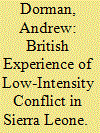

|
|
|
| 8 |
ID:
067633
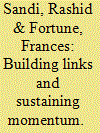

|
|
|
| 9 |
ID:
142609
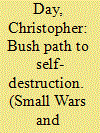

|
|
|
|
|
| Summary/Abstract |
This article explains the demise of Sierra Leone's Revolutionary United Front (RUF) rebellion. It argues that the main cause of this fate was the group's relationship with its primary sponsor, Charles Taylor. The RUF's dependency on Taylor's patronage, coupled with the rebellion's weak organisational endowments harmed the group's prospects of success. Based on original research, the article shows how Taylor used the RUF as a strategic instrument for his own regional interests, which led to the group's unravelling. More broadly, the article speaks about proxy warfare in Africa and how the relationship between resource flows and rebellion are not always beneficial to rebels as one might expect.
|
|
|
|
|
|
|
|
|
|
|
|
|
|
|
|
| 10 |
ID:
168866
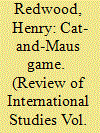

|
|
|
|
|
| Summary/Abstract |
Several scholars have raised concerns that the institutional mechanisms through which transitional justice is commonly promoted in post-conflict societies can alienate affected populations. Practitioners have looked to bridge this gap by developing ‘outreach’ programmes, in some instances commissioning comic books in order to communicate their findings to the people they seek to serve. In this article, we interrogate the ways in which post-conflict comics produce meaning about truth, reconciliation, and the possibilities of peace, focusing in particular on a comic strip published in 2005 as part of the Sierra Leone Truth and Reconciliation Commission Report into the causes and crimes of the 1991–2002 Civil War. Aimed at Sierra Leonean teenagers, the Report tells the story of ‘Sierrarat’, a peaceful nation of rats whose idyllic lifestyle is disrupted by an invasion of cats. Although the Report displays striking formal similarities with Art Spiegelman's Maus (a text also intimately concerned with reconciliation, in its own way), it does so to very different ends. The article brings these two texts into dialogue in order to explore the aesthetic politics of truth and reconciliation, and to ask what role popular visual media like comics can play in their practice and (re)conceptualisation.
|
|
|
|
|
|
|
|
|
|
|
|
|
|
|
|
| 11 |
ID:
107343
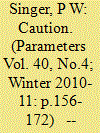

|
|
|
| 12 |
ID:
055931
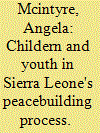

|
|
|
| 13 |
ID:
178170
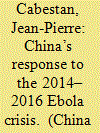

|
|
|
|
|
| Summary/Abstract |
The 2014–16 Ebola crisis in West Africa was China’s very first opportunity to demonstrate its willingness and ability to play a meaningful role in addressing public health emergencies of international concern. China’s decision to participate in the international response to the outbreak was part of an ambition to enhance its contribution to Africa’s security in general and health security in particular and to exert more influence on global norms. The specific role played by the People’s Liberation Army (PLA), especially its Academy of Military Medical Sciences, in Sierra Leone and Liberia is part of an ongoing effort to increase China’s involvement in international humanitarian assistance and disaster relief operations. It was the first time that it sent medical military teams to set up and operate infectious disease hospitals overseas. This participation also underscores the PLA’s crucial role in fighting epidemics overseas as well as at home, as the current COVID-19 pandemic illustrates. The Ebola crisis enables us to explore aspects of the PLA’s overseas missions, some of which are humanitarian and others which generally enhance China’s influence as a great power in Africa and in the world in the context of a growing Sino-US strategic competition.
|
|
|
|
|
|
|
|
|
|
|
|
|
|
|
|
| 14 |
ID:
051893
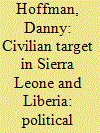

|
|
|
|
|
| Publication |
2004.
|
| Summary/Abstract |
This article traces one of the logics of the ongoing war in the Mano River region of West Africa. It argues that, in the wake of humanitarian interventions in Sierra Leone, combatants who moved on to fight in Liberia were more likely to use attacks against civilians in their military strategy. It suggests, however, that such tactical military choices are to be understood in terms of local contexts of meaning, most notably about the nature of political power. The author's own ethnographic work with the kamajor militia in Sierra Leone and with Liberians United for Reconciliation and Democracy (LURD) in Liberia serves as the basis for this analysis, and he advocates a participant-observation field methodology for the study of contemporary conflict.
|
|
|
|
|
|
|
|
|
|
|
|
|
|
|
|
| 15 |
ID:
120047
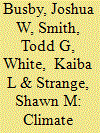

|
|
|
|
|
| Publication |
2013.
|
| Summary/Abstract |
Many experts argue that climate change will exacerbate the severity and number of extreme weather events. Such climate-related hazards will be important security concerns and sources of vulnerability in the future regardless of whether they contribute to conflict. This will be particularly true where these hazards put large numbers of people at risk of death, requiring the diversion of either domestic or foreign military assets to provide humanitarian relief. Vulnerability to extreme weather, however, is only partially a function of physical exposure. Poor, marginalized communities that lack access to infrastructure and services, that have minimal education and poor health care, and that exist in countries with poor governance are likely to be among the most vulnerable. Given its dependence on rainfed agriculture and its low adaptive capacity, Africa is thought to be among the most vulnerable continents to climate change. That vulnerability, however, is not uniformly distributed. Indicators of vulnerability within Africa include the historic incidence of climate-related hazards, population density, household and community resilience, and governance and political violence. Among the places in Africa most vulnerable to the security consequences of climate change are parts of the Democratic Republic of the Congo, Guinea, Sierra Leone, Somalia, and South Sudan.
|
|
|
|
|
|
|
|
|
|
|
|
|
|
|
|
| 16 |
ID:
132395
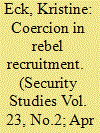

|
|
|
|
|
| Publication |
2014.
|
| Summary/Abstract |
Previous research on rebel recruitment has focused on the economic and social incentives groups used as enticements but has overlooked the question of why many armed groups recruit using coercion. The puzzle is why coercion occurs despite its alienating civilian populations and being costly in terms of organizational and military effectiveness. I suggest that recruitment is a dynamic process and that groups are likely to shift recruitment strategies depending on the exigencies of the conflict. In particular, the exposure of the group to military and economic shocks accompanied by shortened time horizons should lead to increasingly coercive recruitment. Whether forced recruitment is a durable solution for a group in the long run is likely to be contingent upon the group's ability to induce a high level of compliance from the individual at a low cost. Further, in order to circumvent costs vis-à-vis the civilian population, the group must be able to restrict defection to the government and the out-migration of the civilian population. Three narratives from Nepal, Ethiopia, and Sierra Leone are provided both to illustrate the arguments and to probe the scope conditions. The article concludes that understanding why and when rebel groups use forced recruitment has vital security implications for the countries in which armed conflict takes place.
|
|
|
|
|
|
|
|
|
|
|
|
|
|
|
|
| 17 |
ID:
114191
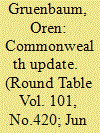

|
|
|
|
|
| Publication |
2012.
|
| Summary/Abstract |
There was little progress in negotiations over the disputed ousting of former president Mohamed Nasheed in the Maldives. In a landmark ruling, the former Liberian president Charles Taylor was found guilty of aiding war crimes and crimes against humanity in Sierra Leone's civil war. Malawi's vice-president Joyce Banda succeeded President Bingu wa Mutharika despite an apparent coup attempt by the brother and ministers of the late Mutharika. There were hopes of a 'Malaysian spring' as record numbers of protesters took to the streets. Pakistan's supreme court found the prime minister, Yousaf Raza Gilani, guilty of contempt of court. The kingdom of Barotseland declared it was seeking to secede peacefully from Zambia.
|
|
|
|
|
|
|
|
|
|
|
|
|
|
|
|
| 18 |
ID:
079882
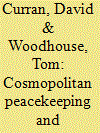

|
|
|
|
|
| Publication |
2007.
|
| Summary/Abstract |
The article is organized into two main parts. First, it presents the termination of the conflict in Sierra Leone as a case-study to examine the degree to which cosmopolitan values connecting peacekeeping and peacebuilding are (or are not) evident. The case-study looks at the United Nations Mission in Sierra Leone (UNAMSIL) as a model of successful peacekeeping in the sense that everyday security was provided for the people of Sierra Leone through the deployment of a robust peacekeeping mission. This assessment needs to be qualified in relation to serious deficits still to be addressed in post-conflict peacebuilding, yet the success of this mission does provide encouragement for those who see the construction of a cosmopolitan security architecture for Africa as both desirable and achievable. Second, it explores the degree to which an appropriate model of cosmopolitan peacekeeping might emerge at regional and continental levels in Africa through the development of the African Standby Force (ASF). What the case-study presented here and the survey of the African Union (AU)/ASF in the second part of the article have in common is that taken together, they provide some evidence to suggest that, however fragile, the AU is beginning to define an agenda that represents a continent wide and, in that sense at least, a cosmopolitan response to African security issues
|
|
|
|
|
|
|
|
|
|
|
|
|
|
|
|
| 19 |
ID:
185658


|
|
|
|
|
| Summary/Abstract |
Like other African nations, Sierra Leone seemed to avoid the worst pandemic scenarios. Its previous experience with Ebola may have led to improved preparedness in the health system. But the government has once again reverted to a militarized response, and elites returning from international travel may pose a risk of spreading the coronavirus. The author also reflects on the challenges of tracking the situation from afar, in the midst of a global crisis, and critically assesses Western media coverage of African public health issues.
|
|
|
|
|
|
|
|
|
|
|
|
|
|
|
|
| 20 |
ID:
020656
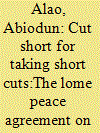

|
|
|
|
|
| Publication |
2001.
|
| Description |
117-134
|
|
|
|
|
|
|
|
|
|
|
|
|
|
|
|
|
|
|
|
|